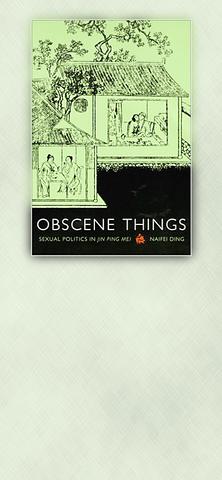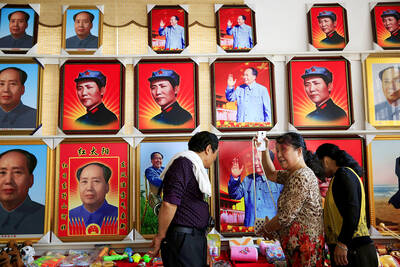This book is in essence a feminist look at the Chinese erotic classic Jin Ping Mei, penned by a professor at Taiwan's National Central University.
Jin Ping Mei was for long considered a pornographic work. Paul Theroux read it on the rail journey through China he described in Riding the Iron Rooster (1988). There he commented, "I went on reading Jin Ping Mei, marveling at its blend of manners, delicacy and smut. What a shame it was still banned in China after five centuries. Truly, if the Chinese were allowed to read it, I felt, they would discover a great deal about themselves."
Professor Ding's book is in fact mostly concerned with how the book has been read, and not read, over the centuries. She examines, with great erudition and not a little eloquence, how it began life as an elegant article much appreciated among the sophisticated literary classes, went on to become a printed work with a much wider readership, acquired prefaces and editorial glosses that turned it into a work warning of the dangers of lascivious women, and was finally banned as likely to undermine public morals.

Three different approaches, or "readings", can therefore be discerned. First it was seen as stylish and amusing, then it was construed as a moral tract, and finally it was condemned an immoral work and a threat to public decency.
Professor Ding goes into all these readings in depth. But the most unusual part of her book comes at the end. There she asks what the approach might be in the context of "dissident erotic relations" in Taiwan at the beginning of the 21st century. In other words, how about a lesbian reading of Jin Ping Mei?
Jin Ping Mei first appeared in manuscript form in the early 17th century. No author was named. Some scholars have thought it was probably the work of a group, but neither its authorship, nor whether it was a solo or a collective enterprise, have ever been established.
The bulk of the book tells a tale, set in the Sung dynasty, of a self-made man, Ximen Qing, and his many wives, concubines and other lovers. Most notable among these is Pan Jinlian, his bondmaid-concubine and, in Professor Ding's words, the "arch-villainess of the story." She is the agent of the deaths of a string of people, and finally of Ximen Qing himself. As a passage quoted by Theroux has it, "A man who sets no bounds to his passion cannot live more than a short time."
As for the lesbian angle, the author looks at a collection of erotic women-with-woman short stories published in Taiwan in 1995. This is Chen Xue's Enu Shu ("The Book of Bad Women"), issued by Huang Guan, a popular press in Taiwan, and promoted at the time as one of a set of books in the category of "new erotica." This, Professor Ding explains, meant erotica produced by Taiwan's emerging gay and lesbian writers.
In fact, it's not so much the stories she considers as their preface, the work of eminent Taiwanese critic Yang Zhao. This preface, Ding explains, urged lesbian writers not to feel guilty, while at the same time cautioning this one for not placing her erotic fantasies in any recognizable social context.
Ding compares this preface to an early introduction to Jin Ping Mei that struggled to establish the image of its author as a virtuous male critic enjoying this manifestly erotic work without compromising his own moral purity. Jin Ping Mei's author need not have experienced all these sexual situations himself, this ancient commentator argued, because the mind of a genius can create such things simply by using his imagination.
In this context, Naifei Ding interestingly refers to "the new social and political forces at work in Taiwan at the moment, when democratizing momentum is fast transforming into a reticent policing of social and sexual dissidents."
She backs this up by referring to "the police harassment of gays on [Chengde Road]," and the "abolishing of licensed prostitution in Taipei as part of an anti-obscenity and anti-pornography campaign and policy." More from her on this controversial and fascinating topic would have been welcome.
Taiwan is in fact frequently mentioned. There are references to the twilight, "penumbralike" status of its sexual dissidents, plus a story about a "nunnish aunt [who] finds, not so surprisingly, a copy of Chen Xue's book in her tomboyish high-school dropout niece's bedroom."
Professor Ding also refers to "the then-president of Taiwan" taking his entire family to see Li An's pro-gay and Taiwan-related film The Wedding Banquet.
Also mentioned is the way that Filipino, Thai and Indonesian domestic servants in contemporary Taiwan are sometimes perceived as posing a sexual threat to their middle-class housewife employers, a situation comparable to that which existed when husbands had live-in concubines or "junior wives."
Essentially, though, these are marginal points in a dense text largely devoted to literary and historical matters, and aimed at scholarly readers.
The book is part of a proliferating academic genre that promotes radical sexual causes when reading classic literary texts. Such works usually refer to the same set of authorities -- Gayatri Spivak, Julia Kristeva, Georges Bataille and others -- and can, at worst, reduce the range and variety of past literature to a monotonous uniformity, however admirable these critics' socio-sexual aims. Professor Ding's book, however, distinguishes itself from the pack by virtue of its vigor, lucidity, and considerable independence of mind.
An authoritative source informs me that it's rare for a Taiwanese academic to publish with an American university press in this way. But Naifei Ding, the source continues, is fluently bilingual, having been brought up in South Africa (and indeed the country constitutes part of her name). This, therefore, is a significant book, both for Taiwan and for contemporary Chinese studies as a whole. The author is to be complimented, even if some passages proved in the event too specialized for this particular reviewer to grasp in their entirety.

Taiwan can often feel woefully behind on global trends, from fashion to food, and influences can sometimes feel like the last on the metaphorical bandwagon. In the West, suddenly every burger is being smashed and honey has become “hot” and we’re all drinking orange wine. But it took a good while for a smash burger in Taipei to come across my radar. For the uninitiated, a smash burger is, well, a normal burger patty but smashed flat. Originally, I didn’t understand. Surely the best part of a burger is the thick patty with all the juiciness of the beef, the

The ultimate goal of the Chinese Communist Party (CCP) is the total and overwhelming domination of everything within the sphere of what it considers China and deems as theirs. All decision-making by the CCP must be understood through that lens. Any decision made is to entrench — or ideally expand that power. They are fiercely hostile to anything that weakens or compromises their control of “China.” By design, they will stop at nothing to ensure that there is no distinction between the CCP and the Chinese nation, people, culture, civilization, religion, economy, property, military or government — they are all subsidiary

This year’s Miss Universe in Thailand has been marred by ugly drama, with allegations of an insult to a beauty queen’s intellect, a walkout by pageant contestants and a tearful tantrum by the host. More than 120 women from across the world have gathered in Thailand, vying to be crowned Miss Universe in a contest considered one of the “big four” of global beauty pageants. But the runup has been dominated by the off-stage antics of the coiffed contestants and their Thai hosts, escalating into a feminist firestorm drawing the attention of Mexico’s president. On Tuesday, Mexican delegate Fatima Bosch staged a

Would you eat lab-grown chocolate? I requested a sample from California Cultured, a Sacramento-based company. Its chocolate, not yet commercially available, is made with techniques that have previously been used to synthesize other bioactive products like certain plant-derived pharmaceuticals for commercial sale. A few days later, it arrives. The morsel, barely bigger than a coffee bean, is supposed to be the flavor equivalent of a 70 percent to 80 percent dark chocolate. I tear open its sealed packet and a chocolatey aroma escapes — so far, so good. I pop it in my mouth. Slightly waxy and distinctly bitter, it boasts those bright,